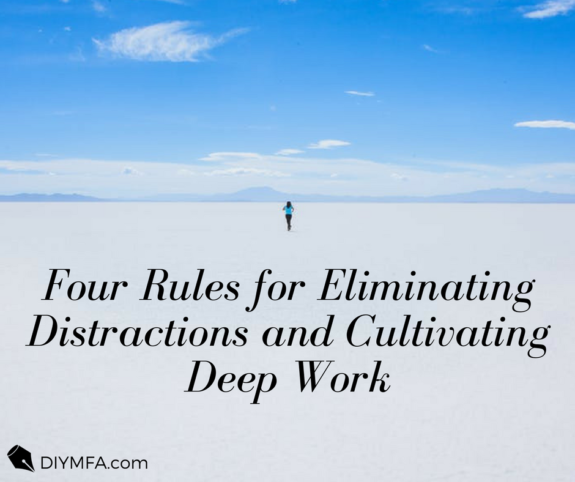How much time do you have to write? How much of that time do you actually spend writing? If you don’t know the answer to the latter question, you may want to take a closer look at your writing routine, because your productivity has the potential to skyrocket if you make a few simple tweaks to your process. I recently read the book Deep Work by Cal Newport, and it changed much of how I approach my writing time.
Newport believes that technological advances have created a culture of distractions and interruptions that makes it difficult for anyone to produce deep, creative work. He gives examples of individuals who were able to produce insane amounts of high-quality work by cutting themselves off from social networks for certain lengths of time, varying from a few hours to several months. These individuals are now outliers, people whose high productivity depends on what’s now considered taking drastic measures.
It’s hard to argue with his logic. Unless you make a concerted effort to turn off all distractions, it’s difficult to attain the kind of productivity that turns out full book drafts in a matter of weeks, or allows a professor to publish nine papers in a year. (Newport himself did this.) Since starting this article, I’ve already been interrupted twice by texts, and once by my own brain telling me to write down an idea for another blog post. But I shouldn’t be having ideas for blog posts when I’m already writing one, and I certainly shouldn’t be sitting anywhere near my phone. I know that if I focus intensely on this topic, I’ll be able to delve deeper and write faster than if I allow outside distractions. And when I’m finished, I’ll be able to move on to the next task with a free mind, even if the next task is checking Facebook to see what I’ve missed while I was working. “When you work, work hard. When you’re done, be done,” says Newport.
Newport lays out several rules for producing good work in limited time.
Rule 1: Work Deeply
One way to do this is by scheduling breaks from focus, instead of scheduling focused time. Most people do this the other way around; when they have a project to commit to, they focus deeply for maybe an hour or so, but allow distraction into their workspace the rest of the time. Newport suggests allowing internet access and even phone access only during previously agreed-upon times. That will allow you to work without the temptation of internet and the distraction of email, allowing your brain to reset and gather itself into a force of focus. When you allow distraction, you’re continually making your brain flit between heavy and light tasks, which tires your brain and eventually wears down your creative muscle. Do one thing for as long as you can, and then turn it off completely and go on to the next thing. This achieves short-term productivity increases, and becomes part of a long-term increase to your focusing ability.
Rule 2: Embrace Boredom
Try not to fill every single empty space in your day. Allow your mind to wander and create for itself, rather than relying on devices.
Rule 3: Quit Social Media
Think of social media as a tool. If spending time on Facebook, Twitter or Instagram is a useful means to an end for either your work or personal life, then go ahead and schedule time to participate. But if it’s a drain on your energy, and doesn’t serve any true purpose, cut your ties and find a new social outlet that fulfills your needs.
Rule 4: Drain the Shallows
Squeeze the unnecessary meetings and chores out of your workweek. Newport references the company 37signals, which allowed its employees to work 4-day weeks from May to October. They weren’t required to make up the hours for that fifth day. Instead, they were encouraged to go deep into focused work, working better instead of longer, so that they could enjoy their extra day in warmer weather. Are you surprised to hear that their productivity levels soared?
Since reading Deep Work, I’ve made the following changes to my daily routine:
1) Turned off social media and email alerts
I reconfigured my phone settings so that I no longer receive any alerts for social media, and my new emails appear on the screen but don’t make a sound. This puts me in control, instead of my smartphone. I’ll read my email and check social media when I’m ready to give it time.
2) Said goodbye to my phone during writing sessions
If people call or text during writing hours, they know I may not respond right away. That’s okay. If I were teaching, no one would expect me to pick up the phone during class. Why should it be any different for writing?
(I also turned off all text alerts from my laptop, because I never wanted them in the first place. Why does Apple seem to think I need every device to make obnoxious noises when I get a message?)
3) Access my social media remotely— most of the time
I use Hootsuite to schedule blog post notifications. That keeps me from getting sucked in when I’m working. I do sometimes still post directly to Facebook or Twitter, but only if I’m prepared to engage.
4) Do what I’m doing, and do only that
This was something I’d already believed in, and Deep Work affirmed it. When I’m doing something, I only do that one thing. This applies to everything from reading to playing with my kids. This helps me stay mindful in the moment, which some scientists say is as good for your brain as meditation.
Do you agree that it’s become more difficult to produce high-quality work amid all the electronic noise? What are your tips for creating an atmosphere of deep work?
 Leanne Sowul is a writer and teacher from the Hudson Valley region of New York. She’s the curator of the website Words From The Sowul and authors the “Be Well, Write Well” column for DIY MFA. She writes historical/literary fiction and memoir; her work is represented by Suzie Townsend at New Leaf Literary Agency. Connect with her at leannesowul(at)gmail(dot)com, or on Twitter @sowulwords.
Leanne Sowul is a writer and teacher from the Hudson Valley region of New York. She’s the curator of the website Words From The Sowul and authors the “Be Well, Write Well” column for DIY MFA. She writes historical/literary fiction and memoir; her work is represented by Suzie Townsend at New Leaf Literary Agency. Connect with her at leannesowul(at)gmail(dot)com, or on Twitter @sowulwords.







